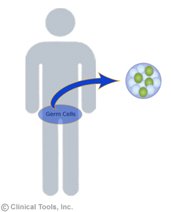What does it mean to have germline mosaicism?
In Duchenne, there are two types of carriers:
- Somatic carriers: females who have the genetic mutation throughout all of their body
- Germline carriers: females who have the genetic mutation only in their ovaries/eggs
If a woman has a child with Duchenne and she has genetic carrier testing performed and it is negative, you might think that she is not at risk to have another affected child since her carrier testing was negative. But several studies have reported women having a second affected child even after negative carrier testing. This is due to “germline mosaicism,” which means that some of her egg cells (her “germline”) carry the Duchenne gene mutation whereas other egg cells do not. However, she does not carry the Duchenne gene mutation in her blood cells, which is why her genetic testing was negative.
Germline mosaicism is not believed to be very common, although it is almost impossible to determine how many women are germline mosaics. The majority of carriers of the Duchenne mutation are somatic carriers, meaning they carry the Duchenne gene mutation in every cell of their body.

There are not likely to be any health concerns for germline mosaic carriers. The cells in the rest of their bodies have two working copies of the gene, so it is possible that women with germline mosaicism have no increased chance for skeletal muscle symptoms or heart changes, though studies have not been done to confirm this for certain.
How is germline mosaicism found?
Women with germline mosaicism will not be found to be carriers via genetic carrier testing, because carrier testing is done on blood or saliva cells. Women with germline mosaicism have mutations in their egg cells, which will not show up on the blood or saliva test.
Because lab testing does not identify germline mosaic carriers, healthcare providers are left to assume that germline mosaicism explains most cases where women have no mutation found on carrier testing but have more than one affected child.
All women who have an affected child and no mutation found on carrier testing have a small chance to have germline mosaicism. It is not known exactly how often this happens, though some studies have suggested up to 15%.
How is Duchenne passed through germline mosaic carriers?
Women with germline mosaicism have an increased chance to have children born with Duchenne, but the exact chance is impossible to know. Women with germline mosaicism can pass to their children, either:
an egg with a working copy of the dystrophin gene, resulting in no increased chance for Duchenne, or
an egg with the copy of the dystrophin gene with a mutation, resulting in an affected son or a carrier daughter (who could have no symptoms or could be a manifesting carrier).
The overall chance to have an affected son or a carrier daughter depends on the amount of eggs with the working copy of the dystrophin gene versus the amount of eggs with a dystrophin gene mutation. Unfortunately, it is not possible to tell how many eggs cells have the dystrophin gene mutation.
For this reason, all women who have one affected child should be offered prenatal testing in future pregnancies, regardless of whether their carrier testing was positive or negative. Learn more about prenatal testing.





